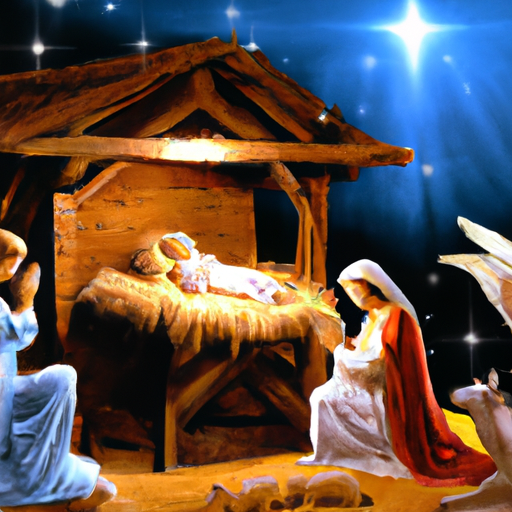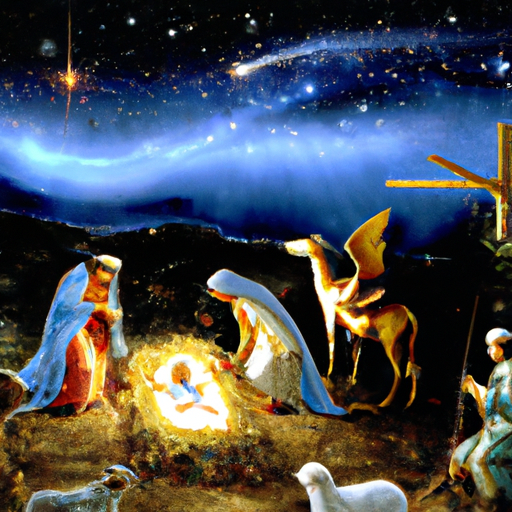In this article, we will explore the incredible story of the birth of Jesus, a pivotal event in history that fulfilled God’s promise. In the small town of Bethlehem, a young woman named Mary gave birth to a baby boy who would change the course of humanity. We will delve into the significance of this miraculous birth and discover the profound impact it continues to have on people’s lives today. So, join us as we journey back in time to witness the fulfillment of God’s promise in the humble manger of Bethlehem.

Background of the Birth of Jesus
The birth of Jesus holds deep significance for Christians around the world. This momentous event was centuries in the making, as it fulfilled numerous prophecies found in the Old Testament. These prophecies spoke of a Messiah who would bring salvation and reconcile humanity with God. The birth of Jesus provided the fulfillment of these ancient promises and brought hope to a broken world.
The Prophecies of the Messiah in the Old Testament
The Old Testament is replete with prophecies foretelling the coming of a Messiah. These prophecies spoke of a ruler from the lineage of David, who would establish an eternal kingdom and bring salvation to all people. Prominent prophecies include Isaiah 7:14, which foretold the virgin birth of the Messiah, and Micah 5:2, which identified Bethlehem as the birthplace of the Messiah. These prophecies set the stage for the miraculous birth of Jesus.
The Genealogy of Jesus
Matthew 1:1-17 provides a detailed genealogy of Jesus, tracing his lineage back to King David. This genealogical record establishes Jesus’ connection to the ancient prophecies regarding the Messiah from the line of David. It highlights the intricate nature of God’s plan, showcasing how every person mentioned in the genealogy played a crucial role in bringing forth the birth of Jesus.
The Virgin Birth of Jesus
One of the most astounding aspects of Jesus’ birth is the fact that he was born to a virgin. In fulfillment of Isaiah’s prophecy, Jesus was conceived by the Holy Spirit and born to the young virgin named Mary. This miraculous event not only emphasized the divine nature of Jesus but also showcased God’s ability to work beyond the natural realm. The virgin birth of Jesus serves as a testament to God’s power and sets him apart as the Savior of the world.
The Announcement to Joseph
As Jesus’ earthly father, Joseph played a pivotal role in the events surrounding his birth. When he discovered that Mary was pregnant, he initially planned to divorce her quietly. However, an angel appeared to him in a dream, delivering a remarkable message.
Joseph’s Dream
In Joseph’s dream, the angel reassured him that Mary’s pregnancy was the result of the Holy Spirit’s work and that he should not be afraid to take her as his wife. The angel also explained that the child would be a boy who should be named Jesus because he would save his people from their sins. This divine revelation transformed Joseph’s perspective and solidified his commitment to Mary and the unborn child.
The Meaning of the Name Jesus
The angel’s message to Joseph included an explanation of the significance of the name Jesus. Jesus, derived from the Hebrew name Yeshua, means “The Lord saves.” By naming the child Jesus, Joseph and Mary obediently acknowledged his purpose, which was to bring salvation to humanity. The name Jesus encapsulates the hope and redemption that would be offered through his life, death, and resurrection.
The Fulfillment of God’s Promise
With the angel’s message, Joseph understood that the birth of Jesus was not just a remarkable event, but the fulfillment of God’s promise to send a Savior. He recognized the magnitude of the situation and embraced his role as the earthly caretaker of the Messiah. Joseph’s faithfulness to God’s plan ultimately ensured that the prophecies surrounding Jesus’ birth would be fulfilled.
The Journey to Bethlehem
The journey to Bethlehem marked the next phase in the miraculous story of Jesus’ birth. It was during this journey that the events predicted by the ancient prophecies began to come to fruition.
The Decree of Caesar Augustus
The journey to Bethlehem was motivated by a decree issued by Caesar Augustus, the Roman emperor. This decree mandated a census that required everyone to return to their ancestral town for registration. This decree inadvertently fulfilled the prophecy that the Messiah would be born in Bethlehem, the city of David.
The Connection to David’s Lineage
Joseph, being of the lineage of David, had to travel to Bethlehem to comply with the census. This journey was an integral part of God’s extraordinary plan to ensure Jesus’ birth took place in the prophesied city. It further reinforced the connection between Jesus and the promised Messiah from the line of David.
Mary and Joseph’s Travels
Mary, heavily pregnant with Jesus, accompanied Joseph on the arduous journey to Bethlehem. The path they walked would have been challenging and uncomfortable, but they persevered with faith, trusting in God’s providence. Despite the physical difficulties, Mary and Joseph’s obedience to the Roman decree and their journey to Bethlehem were essential in bringing forth the birth of Jesus in the prophesied city.
The Birth of Jesus in Bethlehem
The culmination of the incredible events leading up to Jesus’ birth occurred in the humble setting of a stable in Bethlehem. This lowly backdrop for the birth of the Savior held deep spiritual significance.
The Humble Stable Setting
In stark contrast to the grandeur and splendor often associated with kings and rulers, Jesus was born in a simple stable. The rustic surroundings of the stable highlighted Jesus’ humble beginnings and served as a powerful reminder that God works in unexpected ways. The stable became a symbolic representation of God’s love for humanity, demonstrating that he meets us in our most vulnerable and marginalized states.
The Arrival of the Shepherds
As Jesus entered the world, the significance of his birth was proclaimed to a group of shepherds living nearby. These shepherds served as the first witnesses to the miraculous event. An angel appeared to them, announcing the birth of the Savior and inviting them to witness his arrival. The shepherds, awestruck by the heavenly proclamation, hurried to the stable to see the newborn Messiah for themselves.
The Significance of Jesus’ Birthplace
Jesus’ birth in Bethlehem carried profound significance due to its alignment with the prophecies of old. Bethlehem, the city of David, was the prophesied birthplace of the Messiah. This alignment affirmed Jesus’ divine identity and served as a testament to God’s faithfulness in fulfilling his promises. The specific location of Jesus’ birth further emphasized his connection to the Davidic lineage and solidified his role as the long-awaited Savior.

God’s Promise Fulfilled
The birth of Jesus marked the fulfillment of God’s promise to send a Savior who would redeem humanity and offer hope for all. This momentous occasion had far-reaching implications for the world.
Jesus as the Savior of the World
Through his birth, Jesus ushered in a new era, offering salvation and reconciliation to all who would believe in him. Jesus, the Son of God, became the Savior of the world, providing a way for humanity to have a restored relationship with God. His birth signified the beginning of God’s redemptive plan and laid the foundation for his life, death, and resurrection.
The Redemption of Humanity
Humanity’s brokenness and separation from God were addressed through Jesus’ birth. The birth of Jesus brought hope for redemption, offering forgiveness for sins and the opportunity for eternal life. Jesus’ ultimate sacrifice on the cross would fulfill this promise, bridging the gap between God and humanity and offering salvation to all who would receive him.
The Hope for All
Jesus’ birth infused the world with hope. The arrival of the promised Messiah brought the assurance that God had not forgotten humanity but was actively working to bring about their salvation. Jesus’ birth offered hope not only to those alive during his time but to all generations to come. This hope rests in the reality that God is faithful to his promises and that through Jesus, there is eternal life and the assurance of his presence.
The Impact of Jesus’ Birth
The birth of Jesus had a profound impact on those who witnessed it, as well as on the spiritual landscape of the time. This impact extended beyond the immediate events surrounding his birth.
The Witness of the Shepherds
The shepherds who witnessed Jesus’ birth were forever changed by the experience. They became the first evangelists, spreading the news of the Savior’s arrival. Their witness served as a powerful testimony to the miraculous nature of Jesus’ birth and served to ignite faith in the hearts of those who heard their testimony.
The Visit of the Wise Men
Another significant event that occurred after Jesus’ birth was the visit of the wise men or Magi. These learned individuals, guided by a star, traveled from the East to pay homage to the newly born King. Their visit confirmed the significance of Jesus’ birth and served as a representation of the acceptance of Gentiles into the kingdom of God. The coming of the wise men demonstrated that Jesus’ birth had far-reaching implications and was not limited to a specific group of people.
The Shift in the Spiritual Landscape
The birth of Jesus brought about a shift in the spiritual landscape of the world. The hope and salvation offered through Jesus challenged the existing religious systems and established a new way of relating to God. Jesus’ birth marked the beginning of a movement that would eventually reshape the entire world and influence countless lives.
Reflection on Matthew 1:21
As we reflect on Matthew 1:21, we are reminded of the significance of Jesus’ birth and the impact it has on our lives.
Understanding the Meaning of Jesus’ Name
Matthew 1:21 states, “She will bear a son, and you shall call his name Jesus, for he will save his people from their sins.” The name Jesus carries deep meaning, encapsulating his purpose and mission. Understanding the meaning behind his name helps us grasp the significance of his birth and the hope he offers.
Recognizing God’s Faithfulness
Matthew 1:21 also highlights God’s faithfulness in fulfilling his promises. Throughout history, God consistently fulfilled his promises, and the birth of Jesus was the ultimate testament to his unwavering faithfulness. Recognizing God’s faithfulness encourages us to trust in his plans and promises for our own lives.
Applying the Promise to Our Lives
Finally, Matthew 1:21 invites us to apply the promise of Jesus’ birth to our own lives. We can experience the salvation and forgiveness Jesus offers by accepting him as our Lord and Savior. Jesus’ birth is not merely a historical event, but a personal invitation to experience his redemptive work in our lives.
In conclusion, the birth of Jesus stands as one of the most significant events in human history. It fulfilled the prophecies of the Messiah, showcased God’s faithfulness, and brought hope and salvation to the world. The impact of Jesus’ birth continues to reverberate, reminding us of God’s love for humanity and the transformative power of his Son. As we reflect on Matthew 1:21, let us embrace the promise of Jesus’ birth and live in the hope and redemption it offers.







